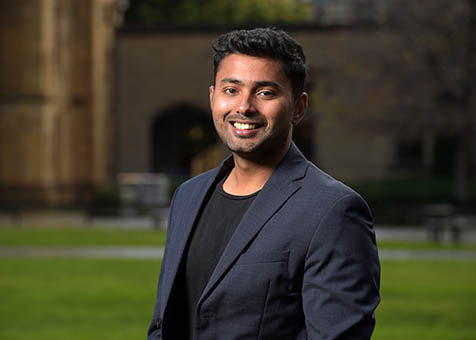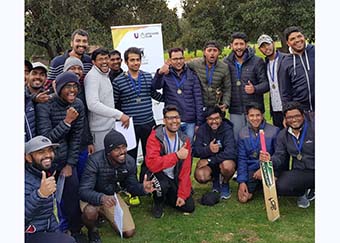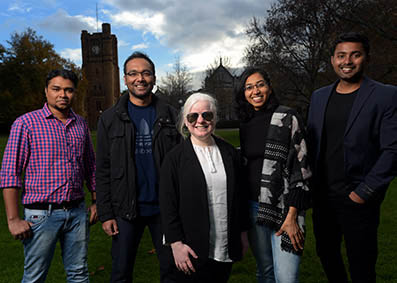Aakash Gupta: Humans of BioSciences
Meet Aakash Gupta who recently completed his PhD on characterising the cell wall of Talaromyces marneffei, a human pathogenic fungus that mostly affects immunocompromised patients. As one of the world’s most feared fungi, it is vital to understand how a fungal spore interacts with the human body. Aakash discusses his dedication to his research and shares his love for cricket.
Aakash completed his PhD through the Melbourne India Postgraduate Program (MIPP) and was co-supervised by Professor Alex Andrianopoulos at the University of Melbourne and Professor Rintu Banerjee at the Indian Institute of Technology Kharagpur.

What was your PhD focused on?
My PhD project involved working on a human pathogenic fungus Talaromyces marneffei. This pathogen mainly infects immunocompromised patients and is endemic to southeast Asia, but a growing number of cases have been recently reported in other parts of the globe. Infections by this pathogen are generally associated with AIDS, therefore it has been named as AIDS defining pathogen, but an increasing number of cases in non-HIV patients have been documented. Immunocompromised people get infected by inhaling the infectious spores of the pathogen and the cell wall of the spores acts as the first point of contact or interaction with our immune cells.
My project was the first to describe the cell wall composition and architecture in T. marneffei and how these different components of the cell wall are modulated in the pathogenic morphological growth form. It provided novel insights into the role played by the different cell wall components during the various stages of host-pathogen interaction, including adhesion and host immune cells evasion, that lead to the disease. Live tracking of the pathogen growing inside the immune cells highlighted significant events including transiting of the spores to the pathogenic state and how this pathogen overrides our defence mechanism. The data generated invaluable knowledge for the discovery of novel antifungal targets and opened up new ventures to explore the host pathogen interaction in more detail. Future in vivo studies in the model organism Galleria mellonella will help to test some of the hypotheses from the project in a whole animal model of infection.

What does your future hold and what do you hope to do next?
My aim is to continue my work on this pathogen as a post doctorate researcher and to comprehensively analyse the host-pathogen interaction in collaboration with other labs working on different fungal pathogens across the globe. Further down the line will be testing proposed antifungal targets in mouse models followed by incorporating this project into pre-clinical trials.
What was your favourite experience at the University of Melbourne and in Melbourne?
Hands down my favourite experience of studying at the University was interacting and socialising with people of different backgrounds and ethnicity. Coming to Melbourne was my first international travel experience and initially I was scared about how I would fit into the community and initiate my work. Fast forward to today, I have a new family here now who helped and guided me throughout my PhD coursework. These interactions have helped me immensely in both my personal and professional growth.
I also have many happy memories of playing cricket each week with my fellow students. I was the President of the Graduate Backyard Cricket Club (GBCC), and each year we arranged an Easter tournament for multiple teams to compete to be the champions of the year. At the GBCC, we welcomed all the students at the University who wanted to play cricket or even just have a good time after their stressful day.
To me, cricket is not just a physical sport, it’s a simulation of life. Just like cricket, life has a set of rules and the challenge is to do well by using your resources in the most optimal way and be the best version of yourself. Cricket teaches optimism.

The Melbourne India Postgraduate Program (MIPP) enables graduate research students to undertake an international joint-training experience at the University of Melbourne and selected elite research Institutes in India including the Indian Institute of Science Bangalore and the Indian Institutes of Technology Kanpur, Madras and Kharagpur.

'Humans of BioSciences' is a special new series to introduce the School of BioSciences' undergrad and postgrad students, our academics, professional staff and associates.